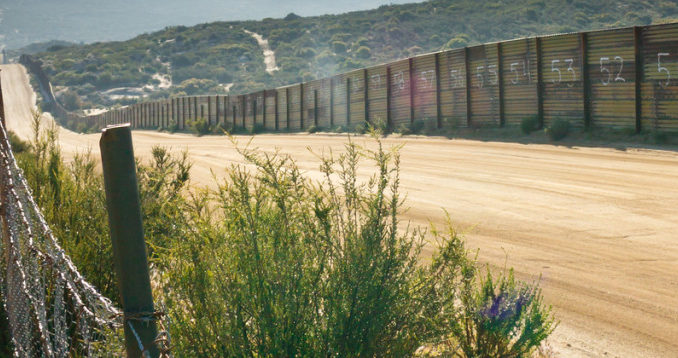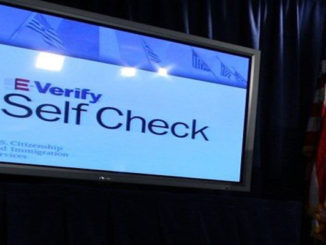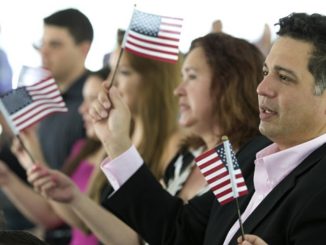
POLICIES FOR THE NEXT ADMINISTRATION. PART 7: IMMIGRATION
This is the seventh in a series on the major policy ideas — from Left and Right — that should guide the next presidential administration’s agenda. (For the opposing view, see F.H. Buckley, “What If Americans Mattered?“)
Our immigration system is broken, and it is paramount that the next administration prioritize its repair. Fixing immigration requires pragmatic changes in three main areas: 1) integrating North American labor markets; 2) prioritizing high-skilled workers and elite foreign graduates; and 3) strengthening opportunities for humanitarian immigration. Implementing these changes will require the next administration to transcend partisan politicking and organize a determined, bipartisan coalition dedicated to innovative policy change.
Successful immigration reform must take the unique circumstances of the United States seriously. Recognizing the importance of the economically and culturally symbiotic relationship between the United States and Mexico rules out an immigration policy like Canada’s, which mainly brings in high-skilled immigrants. This is not to say that our economy and culture wouldn’t benefit greatly from making high-skilled immigration much easier. It would. And there’s a lot we ought to do to make that happen, but it should not be our first and most pressing immigration policy priority.
Integrating North American labor markets
The 11 million undocumented people in the United States underscore that a restrictionist approach to immigration policy — walls, detention, drones — simply hasn’t worked. Like it or not, American labor markets depend on Mexican workers. The prospects of higher wages on the American side of the border draws workers with practically magnetic force. Border guards, fences, dogs, oppressive heat, dehydration, and even the possibility of death don’t keep our Mexican neighbors from seeking opportunity on American soil. In fact, increasing the costs of border crossing make it more likely that undocumented economic migrants, once here, will settle in rather than return home to their friends and family.
Over the past 10 years, there’s been a marked decline in the rate of the American workforce participating in low-skilled jobs. These often physically demanding positions in factories, construction, and agriculture are filled, in part, by temporary workers — agricultural workers (H-2As) and seasonal, nonagricultural workers (H-2Bs). Each year, the United States admits approximately 115,000 agricultural and seasonal workers, usually for less than 12 months, with renewals available for a maximum stay of three years. Because the number of available visas does not meet the demand, undocumented workers — primarily from Mexico — constitute more than half of the 2.5 million workforce.
Both pools of workers — undocumented and documented — are shrinking, and competition is artificially driving up wages. Even with higher wages, better working conditions, and overtime pay, farmers report that Americans still don’t want these temporary jobs, as they often lack benefits and paid vacation time.
Increasing the number of guest-worker visas allows owners to recruit the workers their businesses need. More importantly, lifting restrictions on renewals allows seasonal workers to return home without the fear that they’ll be barred from re-entry. Individuals that are filling seasonal worker jobs can easily be tracked through an entry/exit program, ensuring that employees and employers alike are protected by our labor laws.
To be sure, there are challenges to removing the barriers to low-skilled worker migration. However, if temporary workers have no way to cycle in and out of the country legally, millions of additional undocumented immigrants will come and stay — especially if we militarize the border even further — forcing us to revisit the acrimonious debate over amnesty in another 20 years.
We need to move to a fresh, reality-oriented immigration policy that regulates traffic over the southern border in a way that will meet the needs of the American economy while putting to an end — once and for all — to the mass illegal immigration that creates toxic political conflict.
Prioritizing high-skilled workers and foreign graduates
By reorienting the emphasis of our immigration system away from family-based immigration, we can prioritize high-skilled workers and help retain bright foreign students to sustain American competitiveness in an increasingly globalized economy.
Our need to import more foreign talent is spotlighted in America’s growing shortage of skilled manufacturing workers, healthcare providers, and professionals in the science, technology, engineering, and mathematics (STEM) fields.
Businesses led by foreign talent creates jobs for Americans and brings in revenue that propels our economy. Forty-two spots on the Forbes 400 list are occupied by U.S. billionaires from 21 foreign countries, who have a combined net worth of $250 billion. All but two of these entrepreneurs made their fortunes in the United States. Without these entrepreneurs, America can’t lay claim to successes such as Tesla, PayPal, eBay, Yahoo, Nordstrom, or Panda Express.
Rather than simply increasing the number of H-1B visas (there were 236,000 applications in 2016 for 65,000 available visas), reform needs to omit spouses and children of visa recipients from the statutory cap calculation to free visas never meant for derivatives, and lawmakers need to upgrade the international entrepreneur parole program to a startup visa program.
An integral part of reform is putting an end to fraudulent hiring schemes and outsourcing and ensuring that we capitalize on the top students that America’s universities and colleges attract from around the globe. Entrepreneurs-in-residence programs offer foreign graduates the ability to teach at their school part-time, and spend the rest of their time building their business. In less than two years, the 30 foreign entrepreneurs who received visas through EIR programs in the U.S. created over 200 jobs and raised $120 million in investments.
Without changing the parameters of educational visas to prefer entrepreneurial students and allow for dual intent, we handicap our ability to capitalize on the innovative students that generate jobs and money in the U.S.
Modernizing humanitarian immigration
America’s authority as a global leader requires taking the lead in humanitarian efforts to provide refuge to those fleeing persecution, violence, and war. However, the United States has done far too little to help refugees from the Syrian civil war; we must do more to provide a safe haven for those in need.
A private refugee sponsorship pilot program can serve as a mechanism to translate private-sector support for refugees into increased refugee resettlement numbers. Not only would private sponsorship increase total refugee admissions, it will create a robust, pro-refugee constituency that can push Congress to implement reforms benefiting refugees. Furthermore, it will help forge close relationships between Americans and refugees that ease their integration into American society, reflecting our traditions of openness, compassion, and philanthropy.
Foundations of reform
Extensive policy reforms are meaningless without the linchpins of reform: procedural and administrative improvements — including more due process rights for vulnerable immigrants — that improve the badly backlogged, overburdened, and tired system.
For instance, to alleviate overburdened immigration judges we could: standardize the use of translators; institutionalize fact-finding interviews prior to trial; automate the transfer of relevant federal documentation; and afford counsel to specific, vulnerable populations of immigrants.
More than any other issue, immigration policy reflects the growth and increasing diversification of America. We are at a point in our history where we have a unique opportunity to change our immigration laws to mirror emerging family, employment, and global dynamics — and to make America a safer, more prosperous, and more welcoming nation for all. It is essential that the new administration recognize this opportunity and, finally, implement the long-overlooked policies that would make successful immigration policy reform a reality.
Kristie De Peña is Immigration Policy Counsel at the Niskanen Center.



